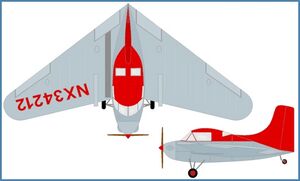Engineering:Cornelius Mallard
| Mallard | |
|---|---|

| |
| Role | two-seat light aircraft |
| National origin | U.S.A |
| Manufacturer | Cornelius Aircraft Co. |
| Designer | George Cornelius |
| First flight | 18 August 1943 |
| Number built | 1 |
The Cornelius Mallard was a single-engined light aircraft of very unusual configuration, tailless and with a swept forward wing of variable incidence. It flew between 1943-4.
Design and development
The Mallard was the third aircraft type produced by Cornelius Aircraft.[1] The first two, the FreWing and the LW-1 were conventional in layout but unusual in using independently variable incidence wings for pitch and roll control. The wings of the Mallard could also be adjusted in the air,[1][2] but they were of low aspect ratio with marked forward sweep. The trailing edge carried conventional ailerons near the tips and elevators close to the fuselage. The Mallard was also a tailless aircraft, in the sense of lacking a horizontal tailplane. The rest of the aircraft was conventional, with single fin and rudder and a side-by-side cockpit for two behind a flat four engine. The undercarriage was fixed and of the tailwheel type. Like other Cornelius designs, the sole Mallard was built by the Spartan Aircraft Company.[1]
The Mallard first flew on 18 August 1943, flown by Arthur Reitherman,[2] though some sources[3] suggest that most of the subsequent 18 flights were in the hands of the Romanian aerobatic pilot Alexander Papana. The first public flight was on 7 September 1943.[2] It was reported to have been 700 lb (320 kg) overweight[1] and there were plans to install a more powerful engine. The designer claimed that the Mallard was stall and spin proof, though the later loss of the much larger but similarly configured Cornelius XFG-1 in an irrecoverable spin has cast doubt on this.[4]
Specifications
Data from [2]
General characteristics
- Crew: 1
- Wingspan: 38 ft 0 in (11.58 m)
- Gross weight: 2,470 lb (1,840 kg)
- Powerplant: 1 × Engine , 130 hp (97 kW)
Performance
- Cruise speed: 125 mph (200 km/h, 109 kn)
References
Notes
Bibliography
- "Cornelius' experiments.". Flight (24 January 1990): 47. http://www.flightglobal.com/pdfarchive/view/1990/1990%20-%200181.html.
- "Underpowered and overweight.". Flight (13 December 1989): 72. http://www.flightglobal.com/pdfarchive/view/1989/1989%20-%203900.html.
- "Out for a duck". Flight (24 September 2002): 47. http://www.flightglobal.com/pdfarchive/view/2002/2002%20-%202859.html.
- "Straight & Level.". Flight (15 November 1989): 63. http://www.flightglobal.com/pdfarchive/view/1989/1989%20-%203551.html.
- Miles, George. "The Tandem Monoplane". Flight (27 April 1944): 444–7. http://www.flightglobal.com/pdfarchive/view/1944/1944%20-%200855.html.
 |

